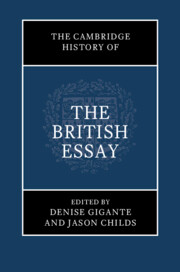Book contents
- The Cambridge History of the British Essay
- The Cambridge History of the British Essay
- Copyright page
- Contents
- Illustrations
- Contributors
- Acknowledgements
- Preface to a History in the Manner of an Essay
- Part I Forming the British Essay
- Part II The Great Age of the British Essay
- Part III Assaying Culture, Education, Reform
- Part IV Fractured Selves, Fragmented Worlds
- Part V The Essay and the Essayistic Today
- 39 The Eye and the I: Essay and Image
- 40 Of Human Suffering: The Essay and Ekphrasis
- 41 After Empire: Postcolonialism and the Essay
- 42 Performance and the Irish Essay
- 43 The Essay and the Public Intellectual
- 44 Essayism in Literary Theory
- 45 The Essay in the Career of the Contemporary British Novelist
- 46 Blogging in Britain: Essays in the Digital Age
- 47 The Essay, Ecocriticism, and the Anthropocene
- Book part
- Bibliography
- Index
41 - After Empire: Postcolonialism and the Essay
from Part V - The Essay and the Essayistic Today
Published online by Cambridge University Press: 31 October 2024
- The Cambridge History of the British Essay
- The Cambridge History of the British Essay
- Copyright page
- Contents
- Illustrations
- Contributors
- Acknowledgements
- Preface to a History in the Manner of an Essay
- Part I Forming the British Essay
- Part II The Great Age of the British Essay
- Part III Assaying Culture, Education, Reform
- Part IV Fractured Selves, Fragmented Worlds
- Part V The Essay and the Essayistic Today
- 39 The Eye and the I: Essay and Image
- 40 Of Human Suffering: The Essay and Ekphrasis
- 41 After Empire: Postcolonialism and the Essay
- 42 Performance and the Irish Essay
- 43 The Essay and the Public Intellectual
- 44 Essayism in Literary Theory
- 45 The Essay in the Career of the Contemporary British Novelist
- 46 Blogging in Britain: Essays in the Digital Age
- 47 The Essay, Ecocriticism, and the Anthropocene
- Book part
- Bibliography
- Index
Summary
Across sub-Saharan Africa, South Asia, and the Caribbean, the English-language essay engages with colonialism and postcolonial reality to embody forms of life writing that grapple with the provocative confluences of English education, local context, and migrant desire. While conflicts between colonial legacy, postcolonial liberation, and creative imagination assume urgency with pioneers such as V.S. Naipaul and Chinua Achebe, linguistic limits on ethical and political values emerge as defining concerns for apartheid-riven writers such as Nadine Gordimer and Zoë Wicomb, while the scope and constraints of postcolonial representation energise the essays of Shashi Deshpande and Amit Chaudhuri. The fluid and constantly changeable identity of the postcolonial subject that drives the aspirations of the postcolonial essay finds language in its promiscuous texture and heterogeneous structure, its dalliance with analysis, narrative, and image, and its perpetually wandering and unfinished form.
Keywords
- Type
- Chapter
- Information
- The Cambridge History of the British Essay , pp. 619 - 634Publisher: Cambridge University PressPrint publication year: 2024

